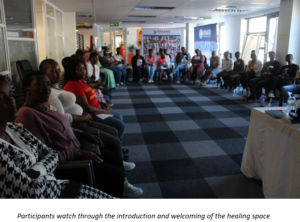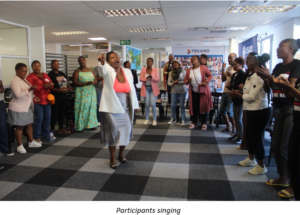
by Afesis – Kagisano and Tekano Fellow
Afesis, through the Kagisano programme, collaborated with Tekano Atlantic Fellow for Health Equity – part of the Kagisano Khayelitsha Steering Committee, to co-host a Mental Health Workshop on 23 February 2024 at the Tekano space in Woodstock, Cape Town.
Among Kagisano’s overall objectives and activities is to create platforms and sessions focused on creating safe and healing spaces to increase understanding, raise awareness, and offer ways to prevent and deal with various forms of traumas and violence experienced by people rendered homeless by the impact of the Covid-19 pandemic. Against this context, Kagisano in collaboration with Tekano Fellow who is also part of the Kagisano programme in Khayelitsha convened a Mental Health Workshop with the aim to find ways of addressing unresolved emotional trauma.
In 2020, during Covid-19 the country witnessed a massive rate of unemployment, which resulted in many people becoming homeless due to an inability to pay rent. Many people occupied land and erected structures, building homes for themselves and their families. While occupiers build homes, many were confronted by Law Enforcement, Metro Police, and SAPS with their building materials confiscated in the process. This confrontation left the occupiers both helpless and hopeless.
This article reflects on the healing space that was created in the form of a mental health workshop. Furthermore, it highlights key moments at the workshop, it touches deeply on issues around mental health and wellbeing.
As mentioned, the purpose of the healing space was to create a safe space for people to freely confront their personal traumas and unpack mental health and wellbeing issues.
Among the mental health issue that was observed in this engagement is that some individuals become suicidal as they are confronted with daily pressures they’re unable to cope with. Unfortunately, many, including the occupiers, lack access to quality healthcare. It is therefore imperative to establish alternative healing spaces offering mental health services tailored to their needs, helping them navigate the trauma they endure.
This workshop marks the first step towards tackling health equity concerning mental health and wellbeing within occupations and informal settlements. It forms part of the Tekano Fellow’s Social Change Initiative. It was a preparatory session meant to prepare the participants for the follow-up 7-day training to be offered by the Tekano Fellow starting in April. The primary objective is to empower communities and building local resources and advocates that will champion mental health issues and wellbeing within their communities.
Many of the leaders and community members that attended found the workshop to be emotionally releasing, with some agreeing that “healing spaces cannot only be for those who afford professional therapy sessions and need to take place more often”. The conversation also centered on what mental health is vis-à-vis the conditions people live through in the South African context, and how to take care of anxiety and depression.
The workshop, attended by 35+ participants, consisted of four mental health organisations: South African Federation for Mental Health, Life Line Western Cape, Life Choice, and Counselling Hub. Each organisation shared their expertise on mental health and facilitated practical exercises on how best to self-care.

According to South African Federation for Mental Health, Life Line Western Cape, Life Choice, and Counselling Hub, mental health issues is are caused by various factors, these include:
- Socio-economic circumstances: A person may be feeling lonely, getting stressed due to real-life social and economic circumstances. Sometimes it is genetic – if someone else in the family has the condition, other members of the family could also be predisposed and more likely to get it.
- Environmental factors: such as a person’s social living circumstances can cause mental conditions too.
- Childhood trauma: Other causes can be childhood abuse, past trauma or violence, being in debt, poverty and economic circumstances, physical illness, and injury, loss of someone close, long-term stress, lack of sleep, diet, divorce, family problems and being stressed by children.
- Self – perception: In addition, negative self-talk in many cases can lead to a person having mental issues.
The key emphasis was that the cause of mental conditions is a complex interplay of many factors – anyone can get a mental health condition. It was also made clear that mental health conditions are different from mental disorders (commonly referred to as mental conditions). Everyone has mental health needs and anyone may experience mental health conditions –whether they are suicidal or suffering from depression. Mental health is universal.
The second layer of the discussion focused on how one can look after their mental health or a mental health conditions: treatment plans, being around family members or getting support from them. Churches and other spiritual and religious practices have also been used as a coping mechanism where many people get help, but this is not a one size fits all situation. Being active in the community can also assist one to be mentally healthy.
In general, people usually find it difficult to speak up when they are faced with problems and challenges. They eventually end up having to deal with these challenges alone and this can lead to extreme cases that involve violence. In some cases the anger building up inside a person overflows. That is why we have tragic situations where people kill others. This usually happens when we are not at peace with ourselves.
How do we take care of ourselves? Talk to someone – a person you can share your emotions to without the fear of being judged. This can be someone outside your family and immediate friends. Another way is seeking professional help: a social worker, counsellor, psychologist or even a therapist. Participants found this advice helpful.
During the discussion two of the participants raised the following points:
“The reality of most participants: informal settlements have no basic service, there is no work, and because of Covid-19 there was a loss of jobs. We built a structure and have lived 4-5 years without water and electricity. Even for those informal settlements that have toilets, the winter season of Cape Town and night time – that affects the mind. How do I cope?”
“Black and white people’s sufferings are different. The majority of people that are experiencing this collective trauma are black people, and the violence is happening to us. This is our lived reality and we have internalized all of this. There should be accountability by government, not just us. Given where we come from historical trauma is still traumatizing us today. Black people have been put in a situation where we need to start minimizing ourselves. We are nothing.”
“I might have a mental breakdown because the stress is caused by someone I live with in the house. I don’t have anywhere to go, what do you in that situation?”
Facilitators highlighted that “although we are different individuals, our collective story is similar; we want to have a better future for ourselves”. Another said, “If we want to change, it requires mental strength, it takes time and positive self-talk.”
To close out the session, a student counsellor shared three techniques that participants can use when they get to their homes. These are an emotional aid that help to deal with emotional pain, scars, and are a tool for stress management – to loosen some of those ropes. Participants were able to also do these practical exercises. One was a butterfly hug where a person wraps their arms around themselves so that each hand touches the opposite shoulder. They then move their hands like the wings of a butterfly to tap their shoulder or upper arm. It is a grounding, soothing exercise that removes one from a situation and then brings them back in.

Overall, participants found the session to be helpful. Some said:
“I found the session to be healing, helpful, and a stress reliever”. Another said “Today learn a lot, thanks God, thanks for the people organizing. Also [the] community, [I am] going to share a lot with them.”
An elderly male participant that is usually someone “serious” said, “Ndibulela not being serious today. I am serious person but today, I am feeling light, I was even laughing.”
Some shared that they were going through personal issues. “Staying at home, didn’t have someone to talk to, also came out and see other things/people.”
Another said, “Thank you for coming with this idea, yesterday [I was] feeling in some other way.”
Truly, the healing space had an impact on people’s lives. Among the participants expressions of gratitude such as “More than words can express, I am over the moon” and “I feel alive, thanks I am here, I am healing” were commonplace.
One participant said, “I learnt a lot, still going to use them. [I am] running a project starting this year, part of people, will benefit more.”
Another said, “Grateful to be here, I need this, I am grateful to God, what I learnt, [as a] mother dealing with a lot of people, gives me more power and more strength.”